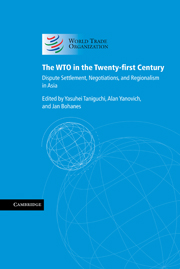Book contents
- Frontmatter
- Contents
- Notes on contributors
- Acknowledgements
- Table of dispute settlement cases and reports
- List of abbreviations
- Introduction
- PART I The WTO at Ten
- PART II Accomplishments and Future Prospects of the WTO Dispute Settlement System
- PART III Asian Perspectives on WTO Dispute Settlement
- 11 East Asia in the WTO dispute settlement mechanism
- 12 Japan's perspectives on the present Dispute Settlement Understanding negotiations
- 13 A review of some appellate decisions: law, policy, and economics in dispute settlement
- 14 Is the WTO dispute settlement mechanism important to business?
- 15 Japan's approach to the ‘use’ of the WTO: how can we achieve an effective link between business and the WTO?
- PART IV The Doha Development Agenda and Beyond
- PART V Asian Regional Integration and the Multilateral Trading System
- Index
12 - Japan's perspectives on the present Dispute Settlement Understanding negotiations
from PART III - Asian Perspectives on WTO Dispute Settlement
Published online by Cambridge University Press: 05 March 2012
- Frontmatter
- Contents
- Notes on contributors
- Acknowledgements
- Table of dispute settlement cases and reports
- List of abbreviations
- Introduction
- PART I The WTO at Ten
- PART II Accomplishments and Future Prospects of the WTO Dispute Settlement System
- PART III Asian Perspectives on WTO Dispute Settlement
- 11 East Asia in the WTO dispute settlement mechanism
- 12 Japan's perspectives on the present Dispute Settlement Understanding negotiations
- 13 A review of some appellate decisions: law, policy, and economics in dispute settlement
- 14 Is the WTO dispute settlement mechanism important to business?
- 15 Japan's approach to the ‘use’ of the WTO: how can we achieve an effective link between business and the WTO?
- PART IV The Doha Development Agenda and Beyond
- PART V Asian Regional Integration and the Multilateral Trading System
- Index
Summary
In this chapter, I offer my personal assessment of the ongoing negotiations to reform the Understanding on Rules and Procedures Governing the Settlement of Disputes (DSU), based on my participation in the negotiations from January 2004 to September 2005.
The dispute settlement system in the past ten years
More than 300 cases have been referred to the dispute settlement system of the World Trade Organization (WTO) in the past ten years. Japan has been a party in more than twenty cases; in half of the cases as a complaining party and in the other half as a responding party. I have had the privilege to participate in some of these cases, and have been involved in the different phases of dispute settlement, including: consultations, the panel, the Appellate Body, the compliance panel, the arbitration, and most recently, the decision to suspend concessions and other obligations, which was the first time Japan took retaliatory measures in ten years. I have come to firmly believe that the present dispute settlement system, as a whole, is a masterpiece created with great wisdom by the original negotiators and cared for with much dedication and enthusiasm by WTO Members, panelists, members of the Appellate Body, and the WTO Secretariat.
The many benefits that WTO Members have received from the system include several significant institutional advantages. First, expansion of policy alternatives and faster solution of disputes. Secondly, accumulation of jurisprudence. Finally, increasing collaboration between diplomats, lawyers and law professors.
- Type
- Chapter
- Information
- The WTO in the Twenty-first CenturyDispute Settlement, Negotiations, and Regionalism in Asia, pp. 267 - 281Publisher: Cambridge University PressPrint publication year: 2007
- 1
- Cited by



